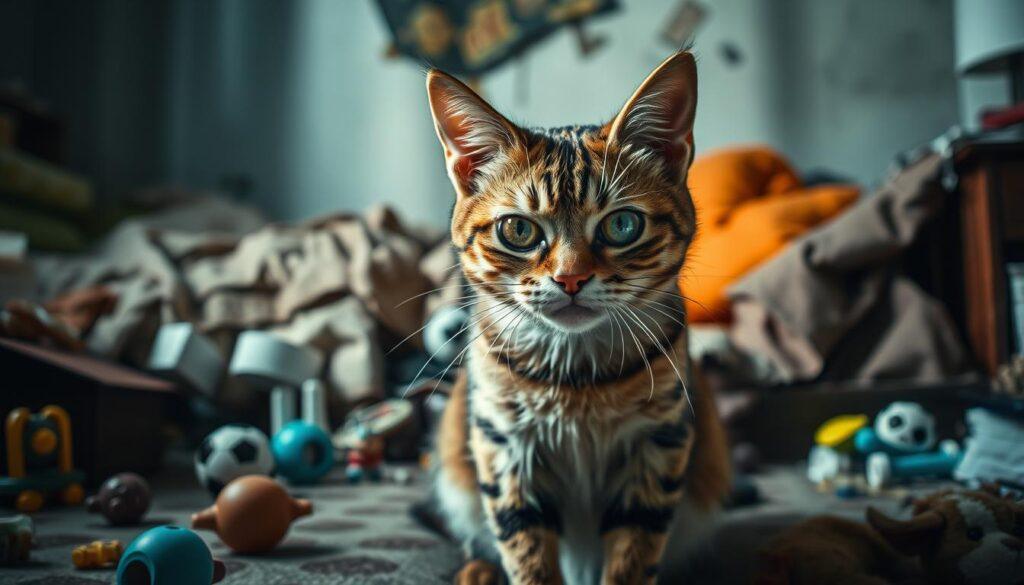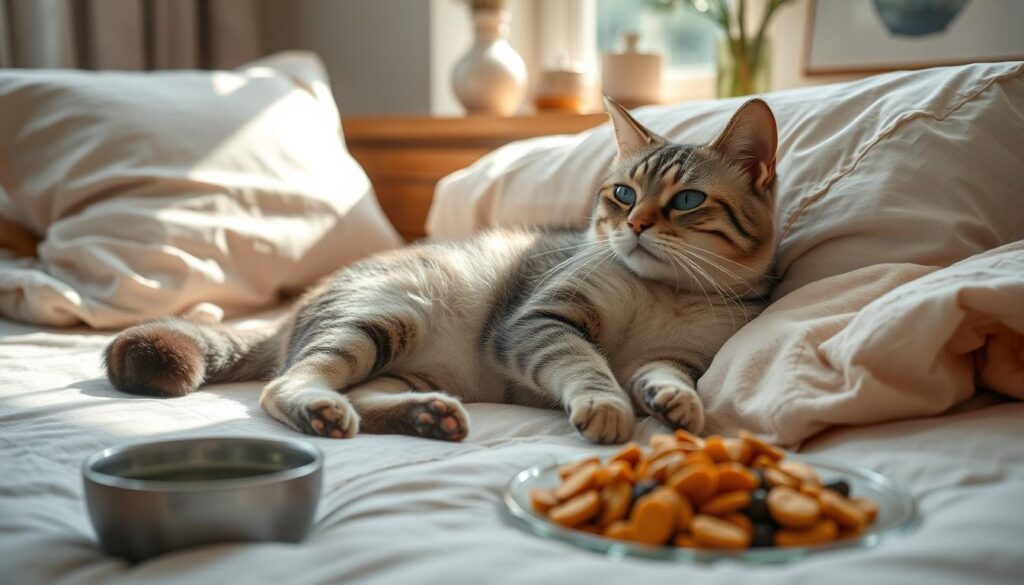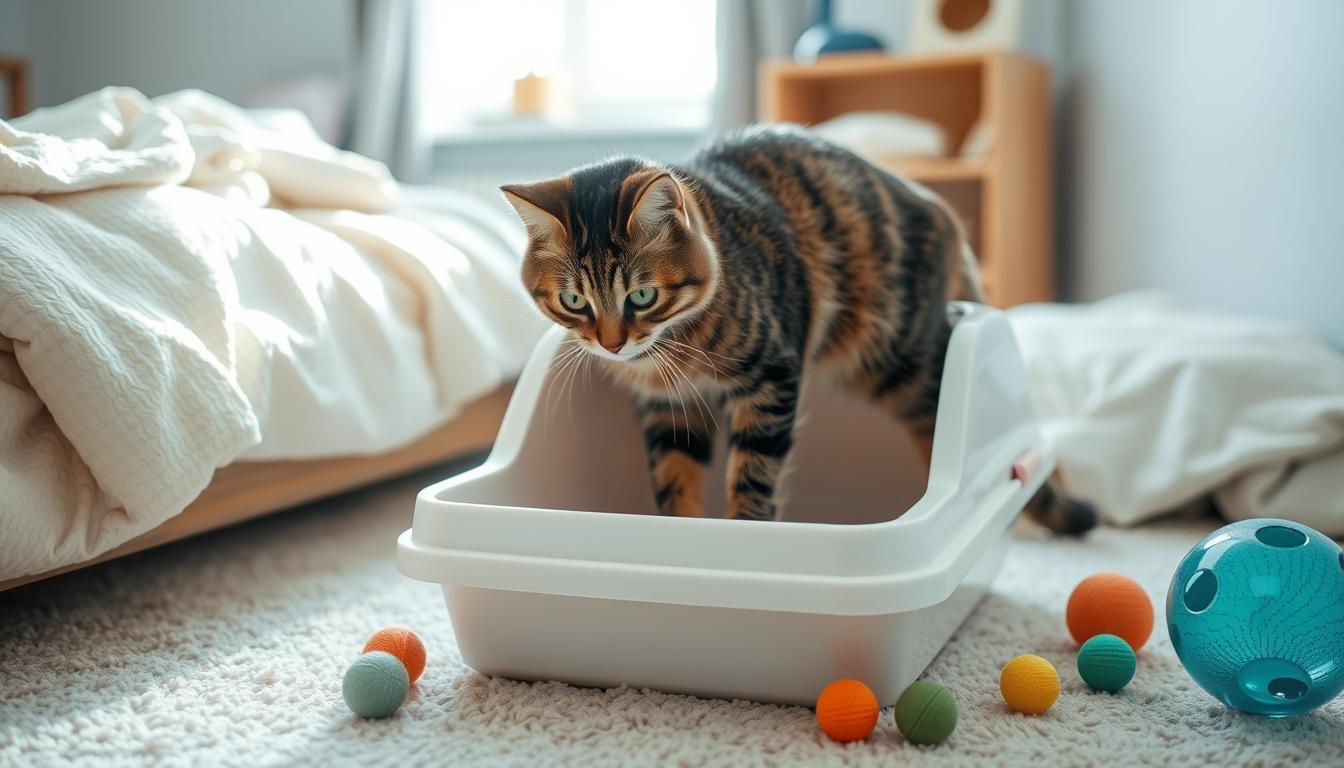Did you know that cats peeing outside the litter box is a big reason for them being given up? It’s a common problem for cat owners. But, cats don’t pee outside the litter box because they’re mad at us. Studies show that up to 10% of cats have trouble with peeing at some point1.
This issue is usually due to health problems, stress, or not liking the litter box. About 15% of cats pee outside the litter box because of health issues. The rest is because of behavioral problems2. To fix this, we need to find out why and take the right steps to solve it.
Cats might not like the litter box for many reasons. These include not cleaning it enough, not having enough litter boxes, or the box being too small. They might also not like the smell of the litter or prefer other surfaces1. Stress can also make them pee outside the litter box. This can happen when a new cat comes home, when there are big changes in the family, or when they’re away from their family for a long time1.
To treat this problem, we can use aversion therapy or attraction therapy. Aversion therapy uses cleaning products to get rid of smells and putting double-sided tape or aluminum foil on surfaces. Attraction therapy includes getting a new litter box, cleaning them often, and using unscented litter. It also means moving the litter box closer to where it was before1. More than 50% of cats stop using their litter boxes because they don’t like the cleanliness2.
Key Takeaways
- Inappropriate urination is a common problem in cats, often caused by medical issues, stress, or litter box aversions.
- Effective treatment involves identifying the underlying cause and addressing it through aversion therapy, attraction therapy, or medical intervention.
- Positive reinforcement can lead to an 80% success rate in correcting inappropriate urination behavior.
- Neutering or spaying a cat can reduce territorial marking through urine spraying by up to 90%.
- Seeking help from an animal behaviorist can lead to successful resolution in over 70% of cases.
Understanding Why Cats Pee on Beds
Discovering your cat pees on your bed can be upsetting, even for experienced owners3. This problem can hurt your bond with your pet and worry about their health3. Cats pee on beds for many reasons, like health issues or unmet needs4.

Medical Issues That Can Cause Inappropriate Urination
Medical problems often lead to cats peeing where they shouldn’t. Issues like diabetes, kidney disease, and urinary tract infections can cause this4. If you think your cat’s behavior is due to health issues, see a vet quickly for help.
Stress and Anxiety as a Trigger for Peeing on Beds
Cats love routine and familiarity. Changes, like moving or new family members, can stress them out. This stress can make them pee on beds. To ease their anxiety, give them daily exercise and use calming products like Bach Remedy Rescue4 or Comfort Zone’s Calming Diffuser5.
Litter Box Aversions and Preferences
Cats pee on beds if they don’t like their litter box. They have specific needs for size, location, cleanliness, and type of litter3. The Humane Society suggests having at least one litter box per cat, plus one more5.
Try different litter boxes and types of litter to see what your cat prefers5. Regular cleaning and the right litter depth can also help5.
Understanding your cat’s needs can solve the problem of peeing on beds453. By meeting their medical, emotional, and environmental needs, you can strengthen your bond453. A routine and a stress-free home are key to preventing future issues.
Identifying and Addressing Medical Causes
When a cat starts peeing on the bed, it’s crucial to consider potential medical causes before assuming it’s a behavioral issue. Feline health issues can often lead to inappropriate urination. Prompt veterinary consultation is essential for accurate diagnosis and treatment.
Urinary Tract Infections and Bladder Stones
Urinary tract infections (UTIs) and bladder stones are common culprits behind inappropriate urination in cats. These conditions can cause inflammation and irritation in the bladder. This leads to frequent and urgent urination. About 10% of all cats are estimated to eliminate inappropriately at some point in their lives6.
Medical conditions such as urinary tract infections, feline interstitial cystitis, bladder stones, and other inflammatory diseases can lead to inappropriate urination in cats6. Inappropriate urination is often the first sign of clinical disease noticed by cat owners, even when affected cats do not exhibit other signs of illness6.
Kidney Disease and Diabetes
Kidney disease and diabetes can also contribute to increased urine production in cats. This makes it challenging for them to reach the litter box in time. These health issues, along with liver disease and hyperthyroidism, can contribute to cats’ inappropriate urination behaviors6. Regular check-ups and early detection of these conditions are crucial for effective senior cat care.
Arthritis and Cognitive Dysfunction in Senior Cats
Senior cat care often involves addressing age-related conditions like arthritis and cognitive dysfunction. These issues can make using a regular litter box difficult. Cats with these issues may find the bed a more convenient and accessible surface for elimination. Age-related cognitive decline can contribute to cats’ inappropriate urination behaviors6. Providing low-entry litter boxes and making necessary accommodations can help senior cats maintain proper litter box habits.

To determine if a medical issue is causing your cat to pee on the bed, observe for other symptoms such as:
- Straining to urinate
- Crying out in pain while urinating
- Increased water consumption
- Lethargy or changes in appetite
If you notice any of these signs, schedule a veterinary consultation promptly. Your vet can perform diagnostic tests to identify the underlying cause and recommend the appropriate treatment plan.
| Condition | Symptoms | Diagnostic Tests |
|---|---|---|
| Urinary Tract Infection | Frequent urination, straining, blood in urine | Urinalysis, urine culture |
| Bladder Stones | Straining to urinate, frequent urination, blood in urine | X-rays, ultrasound |
| Kidney Disease | Increased water consumption, weight loss, poor appetite | Blood tests, urinalysis, ultrasound |
| Diabetes | Increased water consumption, increased urination, weight loss | Blood tests, urinalysis |
Prompt attention to any changes in your cat’s urination habits is essential for their well-being. Don’t hesitate to seek veterinary care if you suspect a medical issue.
Addressing feline health issues promptly not only resolves inappropriate urination but also ensures your cat receives the necessary care for a healthy and happy life67.
How to Punish a Cat for Peeing on the Bed
Punishing your cat for peeing on the bed doesn’t work and can make things worse. Cats may pee on things that smell like their owner when they’re stressed8. Instead, use positive reinforcement techniques and make a calm space for your cat.
Clean any soiled areas well with an enzyme cleaner for pet urine to get rid of smells. Cats often pee on things that smell like their owner8. Keep the litter box clean to lower stress in cats, with regular scooping and changes8.
Creating a stress-free space is key to stopping bad peeing habits. Cats may pee inside when they feel scared or insecure8. Having too many cats can also lead to marking, so managing the household is important9. Regular feeding times and a steady environment can help calm cats9.
To get your cat to use the litter box right, try these tips:
- Put extra litter boxes in quiet spots
- Try different litters to see what your cat likes, as they might avoid the litter box if they don’t like the feel or smell9
- Make sure you have enough litter boxes, one more than the number of cats9
Daily, predictable positive interactions with the cat, such as play or grooming, can help them relax and feel secure.
Introducing new people to your cat in a positive way can help them feel less stressed8. Spaying or neutering your cat can also help stop territorial spraying, especially in males89.
By using positive reinforcement techniques, keeping the litter box clean, and making a calm space, you can solve your cat’s bed peeing problem without punishment.
Creating a Stress-Free Environment for Your Cat
Cats are sensitive and do best in calm, nurturing places. If they feel stressed or anxious, they might pee on things they shouldn’t. About 10% of neutered male cats and 5% of neutered female cats may pee around the house10. To stop this, making a stress-free space for your cat is key.
Reducing Anxiety with Pheromone Products
Using feline pheromone therapy can make your home calmer. Products like diffusers or sprays mimic the calming pheromones cats naturally make. They help reduce anxiety and make your cat feel better. These products can also help when introducing new cats to your home, preventing fights and spraying11.
Providing Adequate Resources and Playtime
Keeping your cat happy and healthy means giving them lots of enrichment. Make sure they have many litter boxes, food and water bowls, scratching posts, and perches. Having one litter box per cat plus an extra can cut down on spraying in homes with more than one cat11. Playing with your cat helps them release energy and strengthens your bond. Regular play keeps them active and mentally sharp, reducing stress and anxiety.
| Resource | Quantity | Benefits |
|---|---|---|
| Litter Boxes | One per cat + 1 | Reduces competition and stress |
| Scratching Posts | 2-3 | Promotes natural scratching behavior |
| Perches and Cat Trees | 1-2 | Provides vertical space and security |
A quick internet search reveals various remedies and information regarding cats peeing on beds and pillows12.
If your cat still seems anxious, talk to your vet about anti-anxiety meds. Watching how your cat reacts and changing your approach is important to find what works best10.
Don’t punish your cat for peeing on the bed or spraying. It won’t help and can make them more stressed and fearful11. Instead, focus on creating a safe, loving space that meets their needs and makes them feel secure and happy.
Conclusion
Dealing with cats that pee where they shouldn’t involves more than just cleaning up. It’s about understanding their behavior and keeping their living space clean. It’s also important to find out why they’re doing it. Talking to a vet is key to rule out health issues13.
Spayed or neutered cats are less likely to pee outside the box. Getting your cat fixed can also stop them from marking territory, which starts around 5 to 6 months1415.
Having enough litter boxes is crucial. Aim for one per cat plus one extra. Clean them daily and change the litter every month to encourage good habits13. Make sure litter boxes are in different rooms and are the right size. Use soft, unscented, and low-dust litter13.
If your cat doesn’t like the litter, try something else. Look into self-cleaning litter boxes or enzyme sprays to get rid of smells14.
Keeping your cat’s environment calm is vital. Stress can make them pee outside the box15. If your cat keeps peeing in the wrong places, get help from a cat behavior expert15.
Never punish your cat. Instead, use positive methods and work with your vet to find the right solution. By understanding your cat and using these tips, you can stop them from peeing where they shouldn’t. This keeps your home clean and healthy for both you and your cat.
FAQ
What are some common reasons why cats pee on beds?
Should I punish my cat for peeing on the bed?
How can I remove cat urine odor from my bed?
What should I do if I suspect my cat is peeing on the bed due to a medical issue?
How can I reduce stress and anxiety in my cat to prevent inappropriate urination?
What should I look for when choosing a litter box for my cat?
Source Links
- Urinating Outside the Litter Box: What to do when it’s behavioral – Just Cats Clinic – https://justcatsclinic.com/urinating-outside-the-litter-box-what-to-do-when-its-behavioral/
- How To Discipline A Cat For Peeing Outside The Litter Box? – https://www.linkedin.com/pulse/how-discipline-cat-peeing-outside-litter-box-coti-limps-xeome
- How To Stop Your Cat Peeing On Bed Covers and Pillows – Pet Remedy, Pet Calming & Anxiety Relief – https://petremedy.co.uk/how-to-stop-your-cat-peeing-on-bed-covers-and-pillows-2/?srsltid=AfmBOopTMceyIfq5gp73Jy9muZKOstN78wM9-24-S998Y2hCqs8xqjhQ
- Help! My Cat Won’t Stop Peeing On My Bed – https://www.thedodo.com/dodowell/cat-peeing-on-bed
- Why Is My Cat Peeing on My Bed? | Comfort Zone – https://www.comfortzone.com/behavior-blog/urine-spraying/why-is-my-cat-peeing-on-my-bed
- Cat Peeing Everywhere? Tips to Stop Inappropriate Urination – https://bowwowinsurance.com.au/pet-community/pet-talk/inappropriate-urination-in-cats/
- Cat Peeing On Dog Bed? 5 Reasons Why (And How To Stop It) – The Cat and Dog House – https://catanddoghouse.com/cat-peeing-on-dog-bed/
- Understanding Cat Behavior: Is My Cat Punishing Me? – Vetstreet – https://www.vetstreet.com/dr-marty-becker/is-my-cat-punishing-me
- How To Stop a Cat From Peeing Everywhere in the House – https://www.litter-robot.com/blog/how-do-i-stop-my-cat-from-peeing-in-the-house/?srsltid=AfmBOorBClo38_DXkj42gME0IixrwrFTU2QjiN_TY0VAahKjKLF19Tf5
- Why Cats Pee Outside the Litter Box + How to Stop Them – https://www.expertcatcare.com/article/cat-peeing-everywhere-causes-and-solutions
- Cat Spraying: Why Cats Do It and How to Stop It – https://www.petmd.com/cat/general-health/cat-spraying-why-cats-do-it-and-how-to-stop-it
- How To Stop Your Cat Peeing On Bed Covers and Pillows – Pet Remedy, Pet Calming & Anxiety Relief – https://petremedy.co.uk/how-to-stop-your-cat-peeing-on-bed-covers-and-pillows-2/?srsltid=AfmBOoqkeYrNPHvItueGTCU9NFiDqARv75xb0TTmJnupy-yIozUusUcA
- No title found – https://educhateur.com/en/errors-urine-outside-litter-box/
- Never Punish A Cat For Peeing On Carpet: Here’s What To Do Instead – https://www.cuteness.com/article/punish-cat-peeing-carpet/
- Why Did My Cat Pee on Me While I Was Sleeping? 5 Likely Reasons – Catster – https://www.catster.com/cat-behavior/why-do-cats-pee-on-humans-while-sleeping/


